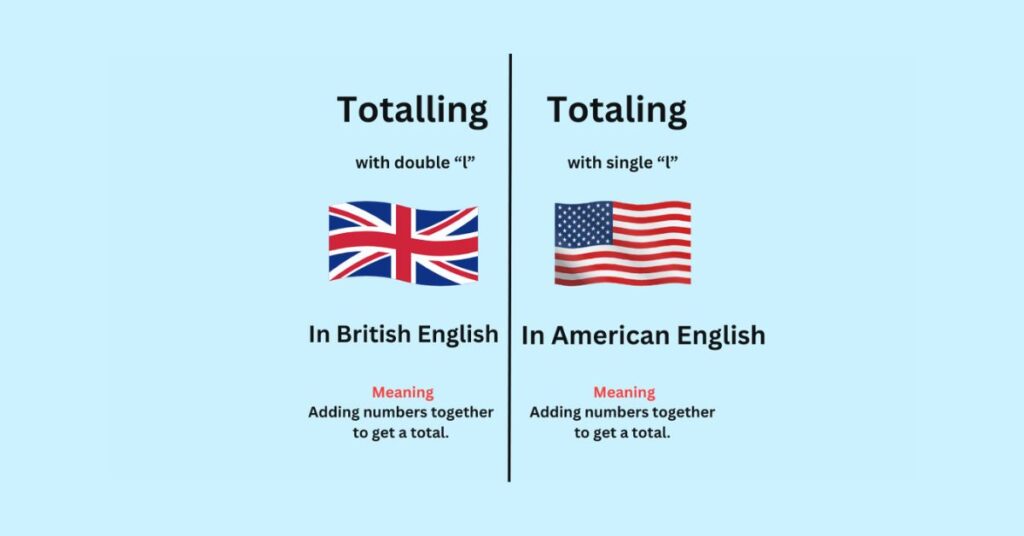When it comes to English spelling, regional variations often spark debates and confusion. One common example is the difference between “totalling” and “totaling.” While they share the same meaning, their usage depends on the dialect of English being used. This article explores the meanings, differences, and proper usage of these spellings, ensuring clarity for both British and American English audiences.
What do “Totalling” and “Totaling” Mean?
“Totalling” and “totaling” both mean calculating or summing up values or amounts. They are often used in contexts like mathematics, accounting, or summarizing items. The difference in spelling arises from regional language preferences rather than any change in meaning.
| Word | Meaning |
| Totalling | Summing up (British English) |
| Totaling | Summing up (American English) |
“Totalling” or “Totaling”: What’s the Difference?
The primary difference lies in the region of usage. “Totalling” is the British English spelling, while “totaling” is the American English variant. The variation is due to differing conventions in adding or omitting the second “l” before the suffix “-ing” in these dialects.
Synonyms of “Totalling” or “Totaling”
Some common synonyms include:
- Adding
- Summarizing
- Counting
- Calculating
Note: These synonyms share the core idea of numerical or conceptual addition.
Why There Is Confusion Between “Totalling” and “Totaling”?
The confusion stems from spelling rules in British and American English. British English typically doubles the final consonant before adding a suffix like “-ing,” while American English usually doesn’t if the stress is not on the last syllable. Thus, “total” becomes “totalling” in the UK and “totaling” in the US.
Historical Background of Spelling Variations
English spelling has evolved due to influences from various languages, historical events, and the standardization efforts in the 18th and 19th centuries. Noah Webster’s efforts to simplify American English contributed significantly to these differences.
Influence of Noah Webster
Webster’s dictionaries formalized many American spelling conventions, emphasizing simplicity and consistency. This is why American English tends to drop doubled consonants in unstressed syllables.
British Standardization
In contrast, British English retained older spelling conventions, reflecting linguistic heritage and etymology. As a result, words like “totalling” still carry the double consonant.
Practical Applications of “Totalling” and “Totaling”
Business Communication
In international business, choosing the appropriate spelling can reflect cultural awareness and attention to detail. For instance, using “totalling” in a UK-based report demonstrates sensitivity to local norms.
Academic Writing
For academic purposes, adhering to the style guide of the institution or publication is critical. APA, MLA, and Chicago styles may have preferences for British or American English depending on the audience.
See Also: Pre vs Post: Which Prefix to Use?
Regional Preferences and Global Usage
British English Contexts
In the UK, “totalling” is ubiquitous across professional, academic, and informal writing. It aligns with other doubled-consonant patterns like “travelling” and “cancelling.”
American English Contexts
Conversely, “totaling” is the standard in the US, appearing in everything from technical manuals to creative writing. Consistency with other words like “modeling” and “canceling” is maintained.
Using “Totalling” and “Totaling” in Sentences
Totalling:
“The accountant is totalling all the expenses for the month.”
Totaling:
“The mechanic is totaling the repair costs after the accident.”
Commonly Confused Words Similar to “Totalling” and “Totaling”
Examples of Regional Variants
- “Travelling” vs. “Traveling”
- “Cancelling” vs. “Canceling”
- “Modelling” vs. “Modeling”
These examples illustrate how doubling consonants can differ based on the dialect of English being used.
Importance of Consistency
Regardless of the variant chosen, consistency throughout a document is essential to maintain professionalism and clarity.
A Final Look
The choice between “totalling” and “totaling” depends on your audience. If writing for British readers, use “totalling.” For American readers, “totaling” is the preferred spelling. Both forms are correct, ensuring clear communication as long as consistency is maintained.
Conclusion: Language is dynamic and shaped by cultural norms. Recognizing these differences helps us adapt and communicate effectively.
Read Also: Since vs Sense: Understanding When to Use Each Word
Sources
- Oxford English Dictionary
- Merriam-Webster Dictionary
- Cambridge Dictionary
Frequently Asked Questions
Is “totalling” more formal than “totaling”?
No, the formality is the same. The spelling difference is regional.
Can I use “totalling” in the US?
You can, but “totaling” is more widely recognized in American English.
Are there other examples like this?
Yes, “traveling” vs. “travelling” and “canceling” vs. “cancelling” follow similar patterns.
What determines the spelling rules in different regions?
Spelling conventions stem from historical influences, linguistic patterns, and regional standardizations.
Should I use British or American English in formal writing?
This depends on your audience or the style guide being followed. Consistency is key regardless of the variant you choose.
Are both “totalling” and “totaling” acceptable in international settings?
Yes, both are understood globally, though regional preferences should be respected.
Stay in touch with us for more new and updates on techlushs.com


